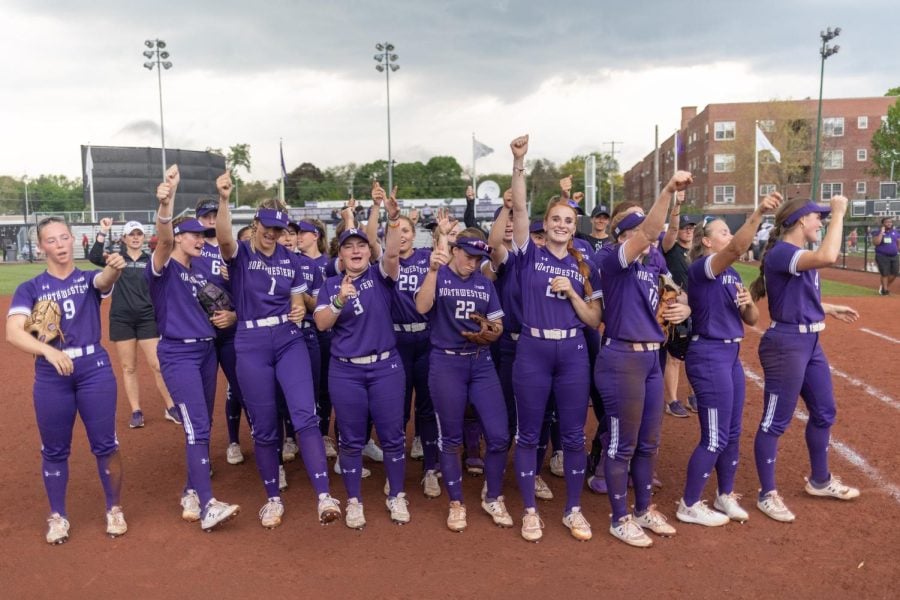‘Compete and win’: Former Northwestern women’s sports figures discuss the early years of Title IX
Daily file photo by Jorge Melendez
Northwestern softball celebrates after its NCAA Tournament opening win over Oakland in May of 2022.
October 27, 2022
When former softball coach Sharon Drysdale arrived at Northwestern in 1979, the team had no field. The Wildcats played at a park on Lincoln Street that featured just benches — no dugouts or fences.
Eventually, NU found a home field, but it was still missing fences.
While the resources weren’t always perfect, Drysdale said her mentality never wavered.
“You went out of any meeting thinking, ‘Yeah, we can do this,’” Drysdale said. “‘We can do this, it doesn’t matter.’ And so the women’s programs were very successful in the early days at Northwestern and continue to be very successful (today).”
Drysdale, the legendary coach whose name adorns NU’s softball field, was part of the first generation of women coaching women’s sports at NU following the passage of Title IX in 1972. As colleges sought to figure out funding women’s sports and providing resources in the wake of Title IX, Drysdale and others in women’s college athletics bore the brunt of widespread changes and lack of resources.
Drysdale received her Ph.D. from the University of Iowa in 1972 and took her first coaching gig at the University of Kansas. In Lawrence, Kansas, Drysdale served as the coordinator of women’s athletics and coached basketball, field hockey and softball.
During her tenure at Kansas, she said she was strapped with a limited budget. When she asked for $20,000 for her budget, the Jayhawks’ athletic director denied her request.
“I was told even by the athletic director, ‘It’s not gonna work,’” Drysdale said. “‘Nobody cares how you do, whether you play or not. Nobody comes to watch, nobody wants to play. I bet you wouldn’t even find enough to even make a team in some of these sports.’”
But Drysdale found a better situation in Evanston.
Drysdale said then-athletic director Doug Single, who took the job at NU in 1981, was incredibly supportive of women’s athletics, which was “atypical” at the time. He told Drysdale that while the University had fewer scholarships and a smaller budget than other Big Ten schools, what NU could do was compete and win.
Drysdale said while Title IX bred animosity between male and female coaches and programs, the University’s advocacy was a beacon of hope.
“We didn’t have what everybody else had, but we had the administration’s support,” Drysdale said. “It was kind of like, ‘We’re the underdog, but let’s go get ‘em.’”
Drysdale and the Cats did, in fact, find great success on the diamond.
At the helm of NU softball from 1979 to 2001, Drysdale led the Cats to three consecutive Women’s College World Series appearances from 1984 to 1986. Throughout 23 seasons in Evanston, Drysdale and NU recorded 13 30-win campaigns.
Karen Stack Umlauf (Communication ‘83), a standout women’s basketball player for the Cats in the early 1980s and now NU’s director of women’s basketball operations, agreed with Drysdale. Stack Umlauf said she and the women’s basketball team felt treated well at the time, and the team’s basic needs like adequate uniforms, bus travel and seemingly equal practice time were met.
But she felt there was still progress to be made nationally.
“There was still a long way to go,” Stack Umlauf said. “We sometimes traveled to other schools and we played in their auxiliary gym instead of the main gym.”
Nevertheless, NU women’s tennis legend and former President, Chairman and CEO of the United States Tennis Association Katrina Adams, said it wasn’t until years after her collegiate career concluded that she realized the imbalance among various revenue and non-revenue sports teams at the University.
“A lot of these things are kind of looking back and saying, ‘Why didn’t we have this?’ or ‘Why didn’t we have that?,’” Adams said. “Eighteen years later, we finally had an indoor tennis center.”
Adams, who won the 1987 NCAA Doubles National Championship with Diane Donnelly Stone (Communication ‘87), said it’s “unfortunate” that non-revenue sports will never truly be on level ground with revenue sports like football and basketball.
Since the turn of the century though, women’s sports continue to increase the standard for athletic success at NU.
The women’s lacrosse squad has won seven national championships since 2005, appearing in 13 Final Fours in that span, too. Softball has three WCWS appearances, a trio of Big Ten regular season championships and a conference tournament title since 2006. Field hockey is the reigning national champion.
Women’s basketball has made the NCAA Tournament twice since 2015 and was crowned Big Ten regular season champion in 2020. Volleyball, tennis, cross country, soccer and others have also seen success of late.
“There’s still a long way to go,” Drysdale said. “But compared to where we were, I’m really happy with what’s happened. I’m glad I did it at an academic school. It’s not easy, but I’m proud of that, too.”
Charlotte Varnes contributed reporting.
Email: [email protected]
Twitter: @CervantesPAlex
Related Stories:
— Breaking down some of NU’s top women athletes who have gone pro
— Q&A: Katrina Adams talks Title IX and Northwestern athletic experiences
— Northwestern alumni shine in the sports media world 50 years post-Title IX












